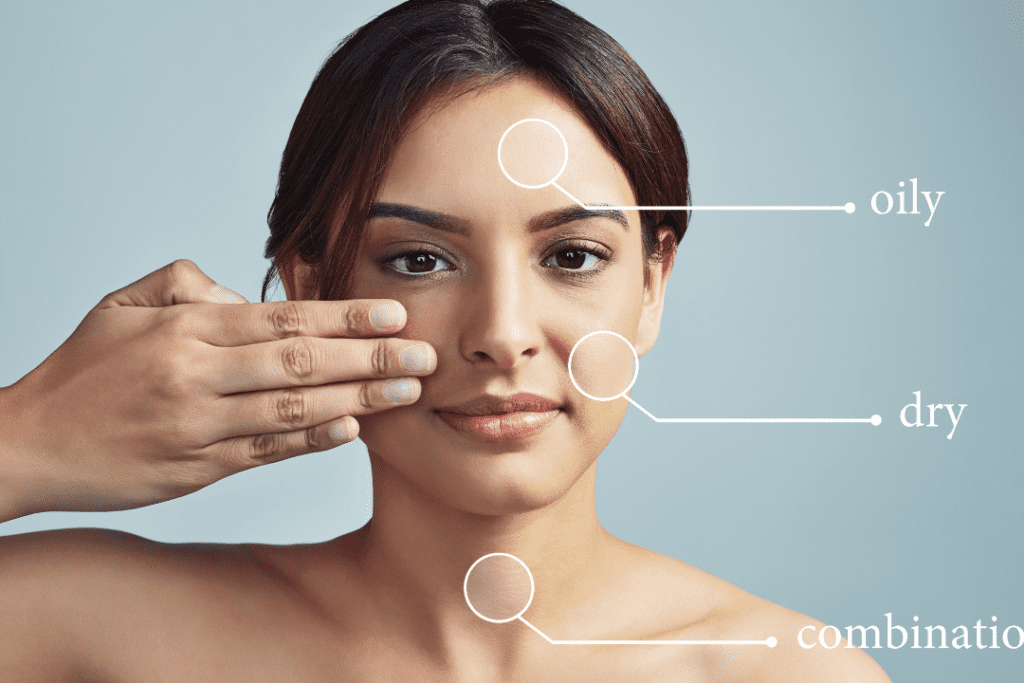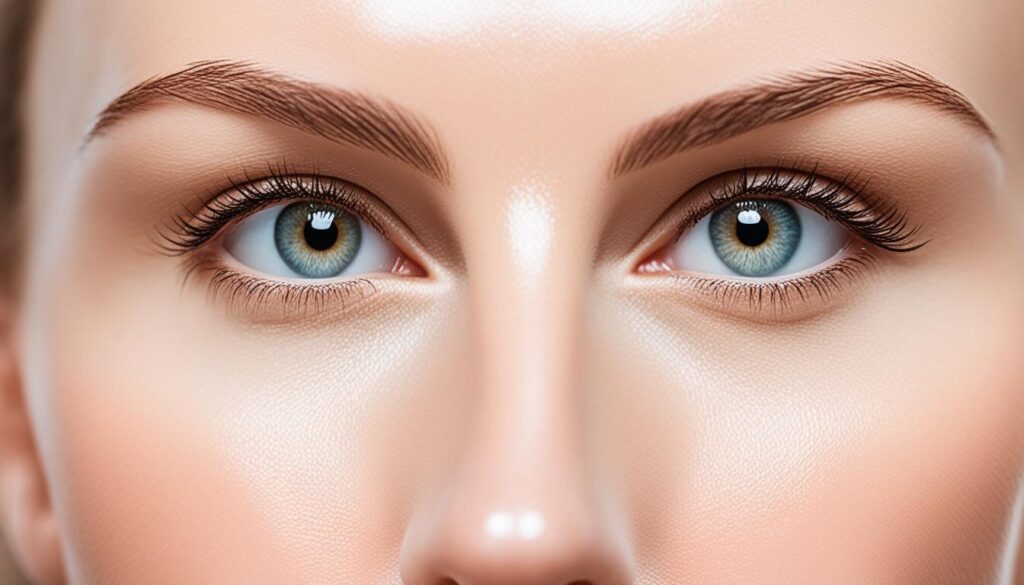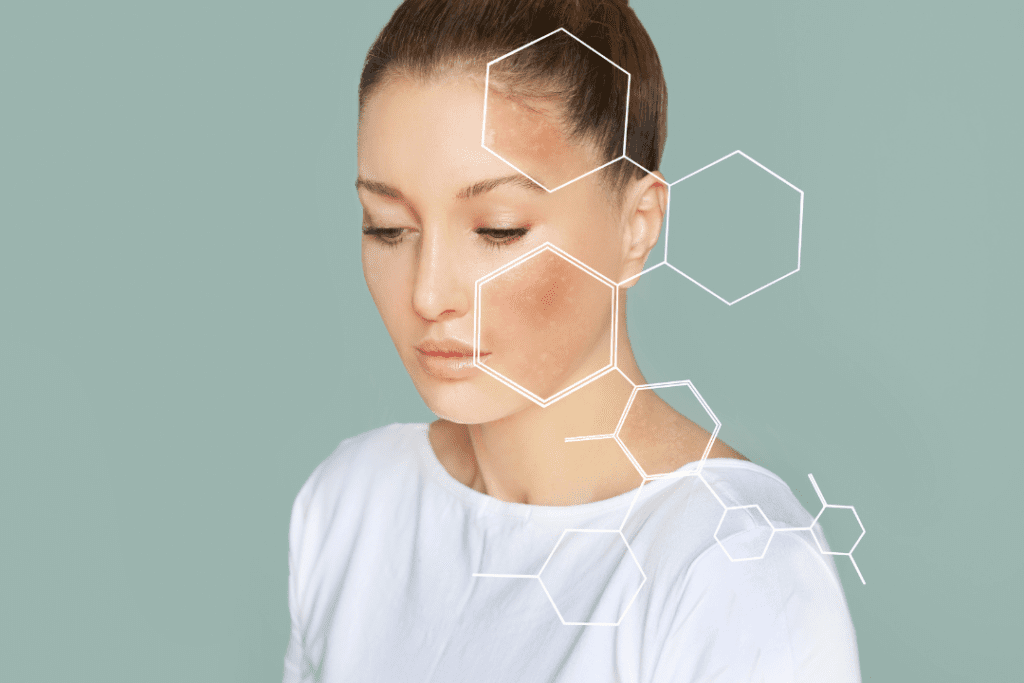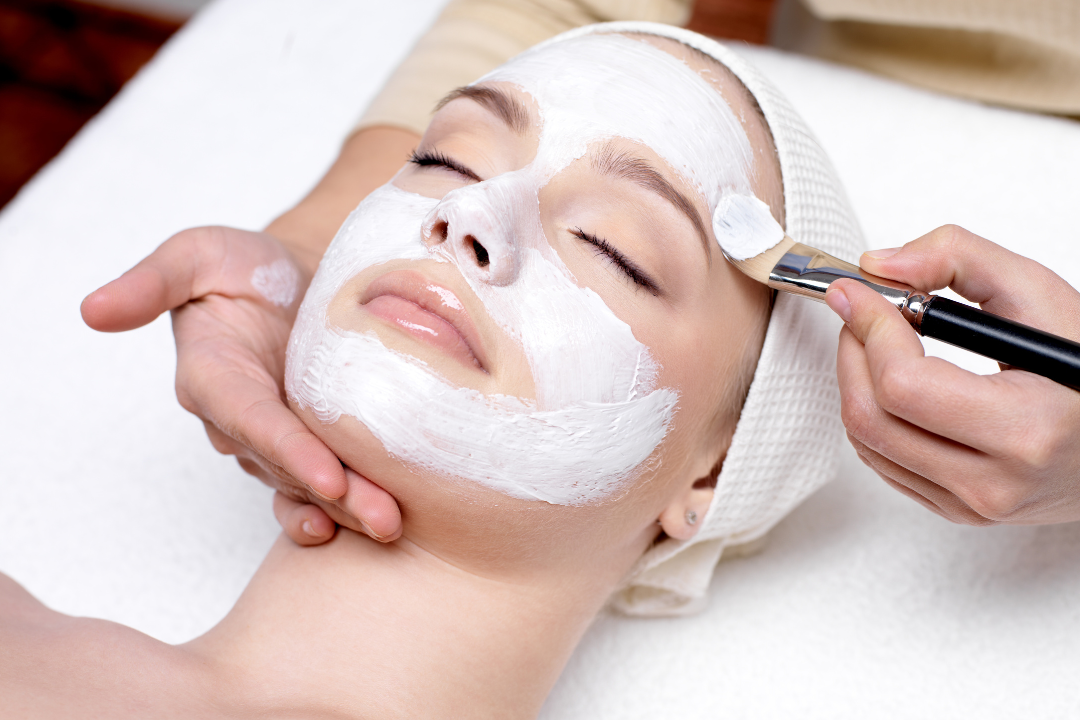Ever wondered why that pricey moisturizer your friend swears by doesn’t work for you? The secret is in knowing your unique skin type. But figuring out your skin type is easier than you think!
At OasisMD in Vancouver, we believe knowing your skin type is key to great skincare. Whether you’re fighting dryness, too much oil, or sensitivity, finding your skin type is the first step to that healthy glow you want.

Ready to unlock your skin’s secrets? This guide will show you simple ways to find your skin type. It will also help you create a skincare routine that fits you perfectly. Let’s start and find the secret to your best skin ever!
Key Takeaways
- Understanding your skin type is crucial for effective skincare
- Skin types can change due to factors like hormones and climate
- Simple at-home tests can help determine your skin type
- Knowing your skin type helps in selecting the right products
- A personalized skincare routine leads to healthier, more radiant skin
Understanding the Importance of Knowing Your Skin Type
Knowing your skin type is key to a good skincare routine. It lets you pick products that meet your specific needs. This leads to healthier and glowing skin. Let’s see why it’s so important.
How Skin Type Affects Your Skincare Routine
Your skin type greatly influences your daily skincare. Different types need different care, from cleansing to moisturizing. For instance, oily skin might need more cleansing, while dry skin needs more moisture. Knowing your type helps you make a routine that suits you.
The Impact of Skin Type on Product Selection
Choosing the right skincare products is all about knowing your skin type. Wrong products can cause breakouts or dryness. For example, heavy creams might block pores on oily skin, while dry skin might not get enough moisture from lightweight lotions. Picking products that match your skin type leads to better results.
Benefits of Tailoring Your Skincare to Your Skin Type
Tailoring your skincare to your skin type leads to better outcomes. It can balance oil, improve moisture, and tackle issues like sensitivity or acne. Using the right products for your skin type means healthier, glowing skin.
“Understanding your skin type is the first step towards achieving your best skin ever.” – OasisMD Skincare Experts
If you’re not sure about your skin type or need advice, visit OasisMD at 8138 Granville Street, Vancouver BC. Their experts can help you figure out your skin type and create a personalized skincare plan. Call them at 604 630 3833 or email info@oasismd.ca for more info.
The Five Main Skin Types Explained
Knowing your skin type is key to good skincare. At OasisMD, we focus on five main skin types: normal, dry, oily, combination, and sensitive. Each type has its own needs and characteristics.
Normal skin is balanced, with few blemishes and a healthy shine. It’s neither too oily nor too dry, making it simple to manage. If you have this skin type, you’re quite lucky!
Dry skin often feels tight and may flake. It lacks natural oils and needs more moisture. If you have dry skin, look for moisturizing products to keep it soft.
Oily skin produces too much sebum, leading to a shiny look, especially on the T-zone. It’s prone to acne and large pores. But, oily skin still needs moisture, so don’t forget to moisturize.
Combination skin is a mix, oily in the T-zone and normal or dry elsewhere. This skin type needs a balanced care routine, using different products for different areas.
Sensitive skin reacts quickly to products or environmental changes. It may feel itchy, burn, or turn red. If you have sensitive skin, choose gentle, fragrance-free products.
“Knowing your skin type is the first step towards achieving healthy, radiant skin,” says the skincare experts at OasisMD in Vancouver.
Visit OasisMD at 8138 Granville Street, Vancouver BC, or call us at 604 630 3833 for personalized skincare advice tailored to your unique skin type.
How Can You Tell What Skin Type You Have
Finding out your skin type is key to good skincare. At OasisMD in Vancouver, we show you easy ways to figure out your skin type at home. This helps you know what your skin really needs, so you can take better care of it.
The Bare-Face Test Method
Begin by washing your face with a gentle cleanser. Dry it well and wait an hour before putting on any products. Look at your skin. If it feels dry and tight, you probably have dry skin.
Oily skin will look shiny. Combination skin is oily in the T-zone but dry elsewhere. Normal skin feels balanced and comfortable.
The Blotting Paper Technique
Use blotting paper on different parts of your face. Check the paper for oil marks. Lots of oil spots mean oily skin, while few spots suggest dry skin.
Combination skin usually has oil in the T-zone only. This trick shows you where oil is on your face.
Observing Your Skin’s Behaviour Throughout the Day
Watch how your skin feels from morning to night. Does it get oily or shiny? Or does it feel tight or flaky?
These signs can tell you about your skin type. Remember, the weather and stress can change how your skin acts.
Using these steps, you can figure out your skin type at home. Knowing your skin type helps you pick the right products and skincare routine. For personalized advice, visit OasisMD at 8138 Granville Street, Vancouver BC, or call us at 604 630 3833.
Characteristics of Normal Skin
Normal skin type is the envy of many. It’s balanced, well-hydrated, and usually free from major issues. If you’re lucky enough to have this skin type, you’ll notice a soft, supple texture and a clear complexion.

- Smooth, even tone
- Small, barely visible pores
- No excess oil or dryness
- Minimal sensitivity
- Rare breakouts
Even with normal skin, it’s important to keep up a consistent skincare routine. As you get older, your skin type might change. Mature skin often needs extra care to stay balanced.
“Normal skin is like a well-oiled machine – it functions perfectly when properly maintained,” says Dr. Sarah Chen at OasisMD in Vancouver.
To keep your normal skin looking great, follow this easy routine:
| Step | Product Type | Frequency |
|---|---|---|
| Cleanse | Gentle cleanser | Twice daily |
| Tone | Alcohol-free toner | Once daily |
| Moisturize | Light moisturizer | Twice daily |
| Sunscreen | SPF 30+ | Daily |
Your pore size and skin health can be affected by your diet, stress, and environment. For personalized advice, visit OasisMD at 8138 Granville Street, Vancouver BC, or call 604 630 3833.
Identifying and Caring for Dry Skin
Dry skin can be tough to handle, but you can get a healthy glow with the right steps. Knowing the signs and how to care for your skin is key to keeping it healthy.
Common Signs of Dry Skin
If your skin feels tight or flakes after washing, you might have dry skin. Other signs include:
- Rough texture
- Itching or stinging sensations
- Visible fine lines
- Lack of natural oil production
Recommended Skincare Routine for Dry Skin
To fight dryness, try this easy routine:
- Use a gentle, creamy cleanser that won’t dry out your skin
- Apply a hydrating toner
- Layer on a rich moisturizer
- Finish with facial oil for extra nourishment
Avoid hot showers and harsh soaps, as they can make your skin even drier.
Key Ingredients to Look for in Dry Skin Products
Look for skincare products with these ingredients:
| Ingredient | Benefit |
|---|---|
| Hyaluronic Acid | Attracts and retains moisture |
| Ceramides | Strengthens skin barrier |
| Glycerin | Hydrates and soothes |
| Shea Butter | Provides deep nourishment |
For personalized skincare advice, visit OasisMD at 8138 Granville Street, Vancouver BC, or call 604 630 3833. Their experts can help you create a routine that suits your dry skin.
Recognizing and Managing Oily Skin
Oily skin can be tough to handle. If you see a constant shine, especially on your t-zone, and often get acne, you might have oily skin. This type often means bigger pores and too much sebum.
To handle oily skin, begin with a gentle cleanser. Choose products that are oil-free and won’t block your pores. Ingredients like salicylic acid or benzoyl peroxide can help with acne and reduce oil.
Don’t forget about moisturizer! Many with oily skin think they can skip it, but it’s key. Pick a light, water-based formula to balance your skin without adding more oil.
- Use blotting papers throughout the day to control shine
- Exfoliate regularly to unclog pores
- Try clay masks to absorb excess sebum
Oily skin needs special care. If you’re dealing with ongoing skin issues, talk to OasisMD in Vancouver. Their experts can give you advice that fits your skin type.
| Skin Concern | Recommended Solution |
|---|---|
| Excess oil | Oil-free mattifying moisturizer |
| Acne breakouts | Salicylic acid treatment |
| Enlarged pores | Clay mask |
“Understanding your skin type is the first step to achieving a healthy, balanced complexion.” – Dr. Sarah Lee, OasisMD
For top-notch skincare advice for oily skin, visit OasisMD at 8138 Granville Street, Vancouver BC, or call 604 630 3833. You can also email them at info@oasismd.ca for more info.
Combination Skin: Balancing Different Skin Zones
Dealing with combination skin can be tricky. It has both oily and dry areas. You need a balanced skincare approach.
Typical Characteristics of Combination Skin
Combination skin often has an oily t-zone (forehead, nose, and chin) and dry cheeks. You might see a lot of oil in the t-zone but feel dryness on your cheeks. This can change with the seasons and hormones.
Tailored Skincare Approach for Combination Skin
A customized routine is key for combination skin. Use a gentle cleanser on your whole face. Apply a light, oil-free moisturizer to the t-zone and a richer cream to dry areas. Use blotting papers to control oil during the day.
Multi-Masking Techniques for Combination Skin
Multi-masking works great for combination skin. Put a clay mask on your t-zone to control oil and a hydrating mask on your cheeks. This way, you address different skin needs at once.
| Skin Zone | Characteristic | Recommended Care |
|---|---|---|
| T-zone | Oily, prone to breakouts | Oil-free products, clay masks |
| Cheeks | Normal to dry | Hydrating creams, moisturizing masks |
| Forehead | Often oily | Light moisturizers, regular exfoliation |
For personalized advice on managing your combination skin type, visit OasisMD at 8138 Granville Street, Vancouver BC, or call 604 630 3833. Their expert team can help you create a tailored skincare routine that addresses your unique skin needs.
Understanding Sensitive Skin and Its Needs
If your skin gets easily irritated, red, or itchy, you might have sensitive skin. This type needs gentle care and the right products to stay healthy.
People with sensitive skin often feel dry and uncomfortable. To help, use products without fragrances and those marked as hypoallergenic. These are less likely to cause reactions and keep your skin balanced.
It’s important to strengthen your skin’s barrier for sensitive skin. Look for products with soothing ingredients like aloe vera, chamomile, and ceramides. These can calm irritation and make your skin more resilient.
“Sensitive skin requires a gentle approach. Always patch test new products and avoid harsh ingredients to keep your skin happy and healthy.” – Dr. Emily Chen, Dermatologist at OasisMD
Always test new skincare products on a small area of your skin first. Apply a small amount to your inner arm and wait 24 hours to see if there are any bad reactions. This step can prevent skin problems later on.
| Do’s for Sensitive Skin | Don’ts for Sensitive Skin |
|---|---|
| Use gentle, fragrance-free cleansers | Avoid harsh exfoliants |
| Apply moisturizer to damp skin | Skip hot showers or baths |
| Wear broad-spectrum sunscreen daily | Don’t use products with alcohol or fragrances |
Remember, sensitive skin can change with the seasons and stress levels. Watch how your skin reacts and adjust your routine as needed. If you’re having trouble with your sensitive skin, OasisMD in Vancouver can offer personalized advice.
Factors That Can Influence Your Skin Type
Your skin type isn’t fixed. Many things can change how your skin looks and feels over time. Knowing what affects your skin helps you pick the right skincare products and routines.
Environmental Impact on Skin Type
Climate and pollution are big factors in skin health. Cold winters can dry out your skin, while hot summers might make it oily. People living in cities often face more skin problems because of pollution. This can clog pores and make skin age faster.
Hormonal Changes and Skin Type Fluctuations
Hormones play a big role in your skin’s health. Changes during menstruation, pregnancy, or menopause can affect how oily or sensitive your skin is. These changes can be temporary or last a long time.
Lifestyle Factors Affecting Skin Type
What you do every day affects your skin. Eating poorly, not sleeping well, and being stressed can cause breakouts and dull skin. Exercise helps by improving blood flow. This makes your skin healthier and helps get rid of dead skin cells.
| Factor | Potential Impact on Skin | Skincare Adjustment |
|---|---|---|
| Dry Climate | Increased dryness, flakiness | Use richer moisturizers |
| Hormonal Changes | Oiliness, acne breakouts | Incorporate oil-control products |
| High Stress | Inflammation, sensitivity | Add calming, soothing ingredients |
Remember, your skin’s needs can change over time. Regularly checking and adjusting your skincare routine is important for healthy skin. For personalized advice, call OasisMD at 604 630 3833 or visit us at 8138 Granville Street, Vancouver BC.
When to Seek Professional Help for Skin Type Determination
Figuring out your skin type can be tricky. Your skin texture might change over time, and how your skin reacts to products can vary. If you’re unsure about your skin type or facing persistent issues, it’s time to call in the experts.
A dermatologist can offer a detailed analysis of your skin. They use specialized tools to examine your skin’s moisture levels, oil production, and sensitivity. This thorough approach helps pinpoint your exact skin type and any underlying conditions.
- Your skin reacts differently to products than before
- You’re experiencing persistent acne or redness
- Your skin texture seems to change frequently
- Over-the-counter products aren’t working
A skincare expert can create a personalized plan that addresses your unique needs. They can recommend products and treatments that work best for your skin type. This targeted approach can lead to better results and healthier skin over time.
If you’re in Vancouver and need expert skin advice, consider visiting OasisMD. Located at 8138 Granville Street, their team can provide professional skin type determination and tailored skincare recommendations. You can reach them at 604 630 3833 or info@oasismd.ca.
| Signs to Seek Professional Help | Benefits of Professional Consultation |
|---|---|
| Persistent skin issues | Accurate skin type determination |
| Confusion about skin type | Personalized skincare routine |
| Frequent skin texture changes | Expert product recommendations |
| Ineffective over-the-counter products | Treatment for underlying conditions |
Remember, your skin is unique. Professional guidance can be the key to unlocking your best skincare routine and achieving healthy, glowing skin.
Conclusion
Knowing your skin type changes how you care for your skin. By figuring out your skin type, you can find the right products for you. This leads to a healthy, glowing look you’ve always wanted.
Your skin type can change because of the weather, hormones, and your lifestyle. So, it’s key to check on your skin often and change your routine if needed. At OasisMD in Vancouver, we’re ready to help you understand your skin type and make a skincare plan just for you.
Are you ready to learn more about your skin? Call us at 604 630 3833 or visit our clinic at 8138 Granville Street, Vancouver BC. You can also email us at info@oasismd.ca. Let’s work together to make your skin look its best!
FAQ
Why is it important to know my skin type?
Knowing your skin type helps you pick the right products for your skin. It ensures you use cleansers, moisturizers, and treatments that work best for you. This tailored approach improves your skincare routine.
What are the five main skin types?
The main skin types are normal, dry, oily, combination, and sensitive. Each type has its own needs and requires a specific skincare strategy.
How can I determine my skin type at home?
To find your skin type at home, try the bare-face test. Use blotting papers to check for oiliness. Observe your skin’s condition all day for signs of tightness, oiliness, or irritation.
What are the common signs of dry skin?
Dry skin feels tight, rough, or flaky. It may itch, sting, or burn. It also tends to have less natural oil.
What ingredients should I look for in products for dry skin?
For dry skin, look for hyaluronic acid, ceramides, glycerin, and shea butter. These ingredients hydrate and nourish your skin.
How do I care for oily skin?
Use oil-free, non-comedogenic products and gentle cleansers for oily skin. Ingredients like salicylic acid or benzoyl peroxide help with acne. Don’t forget to moisturize with lightweight, water-based formulas. Use blotting papers to control oil throughout the day.
What are the challenges of combination skin?
Combination skin has an oily T-zone and normal or dry cheeks. It needs a balanced skincare routine. Use different moisturizers for oily and dry areas. Consider multi-masking techniques.
How do I care for sensitive skin?
Use fragrance-free, hypoallergenic products on sensitive skin. Avoid harsh ingredients and extreme temperatures. Strengthen your skin with gentle ingredients like aloe vera, chamomile, and ceramides.
Can my skin type change over time?
Yes, your skin type can change due to environmental factors, hormonal shifts, and lifestyle changes. Be ready to adjust your skincare routine as needed.
When should I seek professional help for skin type determination?
If you’re unsure about your skin type or have ongoing skin issues, see a dermatologist or skincare expert. They can give you a detailed analysis and personalized advice. This is especially helpful for sensitive skin, chronic conditions, or complex skincare needs.



